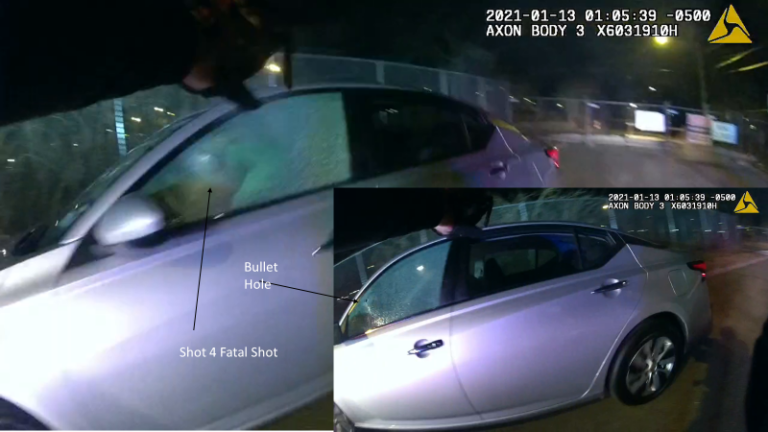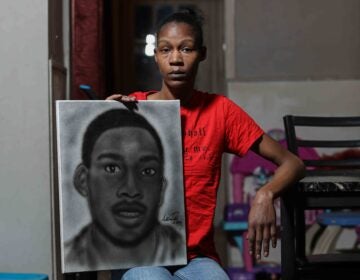Delaware attorney general won’t prosecute two police officers who killed Lymond Moses
Attorney General Kathy Jennings’ report criticized officers’ training and police policies, but said prosecuting the two who shot Moses was not justified under the law.

This photo from the Attorney General's report shows the Officer Roberto Ieradi's body camera footage of his fourth and fatal shot of Lymond Moses. (State of Delaware)
Prosecutors won’t charge two white New Castle County police officers who shot and killed a Black motorist who drove toward them in Wilmington. The January shooting led to several protests, including some at the home of Attorney General Kathy Jennings.
Jennings released her office’s long-awaited report on the killing of 30-year-old Lymond Moses on Monday. She acknowledged that issues raised in the case have “gone directly to the heart of the national debate over police use of force … and has begged the question of whether that which is lawful is also necessary and just.”
Jennings also said she realizes her decision will not be “popular in all corners” but that her office and her Division of Civil Rights and Public Trust must follow the law.
“There will be those who believe we should press charges irrespective of our findings,’’ Jennings wrote in the report. “But that asks us to violate our ethical, statutory, and constitutional obligations to prosecute only when there is a reasonable likelihood of conviction at trial.”
The law governing police use of deadly force that was in effect when police killed Moses was a subjective standard that essentially shields a Delaware police officer from criminal charges if they believed they or someone else was in imminent danger when they pulled the trigger and then did not act recklessly. The law was changed in June to a more objective standard that evaluates what a reasonable police officer would do in the same situation.
The statute was changed after lobbying by Jennings, who shared a WHYY News exposé that revealed that no Delaware police officer has even been arrested for shooting someone.
Jennings’ office did not evaluate whether Patrolman Roberto Ieradi and Corporal Robert Ellis would have been charged under the new law. The report focused only on the standard that was in effect five months earlier when Moses was killed in the Riverside neighborhood. He fled from police after they approached his car, where he had been sleeping, at about 1 a.m. Police later said the officers were investigating reports of stolen vehicles.
After Moses fled, he drove into a dead-end on a two-way street lined by fencing and turned around. Officers arrived moments later and tried to block his path with three police SUVs. They got out of their vehicles and as Moses backed up, ordered him not to try to get away, the report said.
Instead, Moses drove toward them, not to hit or endanger the officers, but in an attempt to squeeze past them and their vehicles on the right side of the road, according to a lawsuit filed by Moses’ family.
The report said Moses “floored the accelerator” and that Ieradi fired seven shots, including the fatal one to the left side of Moses head, and Ellis shot twice after Moses’ car was past Ieradi, the report said. The car struck Ieradi’s vehicle, then came to a stop. The third officer did not fire his weapon.
Moses’ car passed within three feet of Ieradi while he was shooting, the report said.
The state’s investigation, based on interviews, body camera footage, vehicle crash data and forensics, was conducted with the help of Zane Memeger, former U.S. Attorney for the Eastern District of Pennsylvania from 2010 to 2016, and Nate Andrisani, a former Philadelphia prosecutor.
Jennings said those investigators and her internal team jointly “concluded that the laws in place at the time of the shooting would not support a reasonable likelihood of conviction against any of the officers involved in this incident. I agree with both.”
Amanda Spence, Moses’ widow and the mother of his two children, said Jennings briefed her Monday morning. She said the decision both angers and disappoints her.

She was especially incensed that Ieradi, who fired seven shots including the lethal one to Moses’ head, told investigators he fired not only out of fear for himself but he thought Ellis, who was at least 20 feet behind him and not in the jeopardy of being struck by Moses, was also in danger.
“He shot in reaction to thinking that the officer behind him was in harm’s way,’’ Moses said. “So he made a decision for someone else and I just don’t see it as fair, and Kathleen agreed that that was okay, and it’s justifiable. They’re justifying his murder.”
The report said that during his interview with investigators Officer Ieradi “admitted that he could not see from his vantage point where Corporal Ellis was located, but he believed him to be in the path of Mr. Moses’s car. The lack of communication between the officers as they pursued Mr. Moses’s car and then left their SUVs likely contributed to Officer Ieradi’s inability to assess Corporal Ellis’s location.”
Responding to the report, Spence said: “You don’t have eyes in the back of your head, so how can you say that you’re taking actions for someone?”
The report, though it cleared the officers of criminal wrongdoing, was critical of county police policies and training.
“Of particular note is the need for training that discourages the ineffective and dangerous practice of firing at moving vehicles, which has already been banned in major police departments from New York to Los Angeles,’’ Jennings wrote.
“Such use of force is unlikely to disable a vehicle; dangerous to officers who may be in harm’s way; and dangerous to the driver, passenger, and bystanders, if a driver loses control.”
County Executive Matt Meyer, who had released the police body cam footage two months after the shooting, issued this statement:
“Our thoughts and prayers continue to be with Lymond Moses’ family. We support the Attorney General’s call to standardize police use of force policies across the state. New Castle County police policies are updated continually to ensure that they reflect national standards, and County officers receive rigorous training in the classroom and the field. Tragic incidents like this require appropriate reflection on the policing of our communities, and the county remains committed to putting in the hard work to continue to build community trust.”
Emeka Igwe, attorney for the Moses family, echoed Spence’s disappointment.
“Unfortunately, we are not surprised by the report given the lack of accountability for officers here in Delaware,” Igwe said in a written statement. “Delaware in its history has not prosecuted an officer for the killing of a civilian. Unfortunately, this report continues that same tradition of not holding police officers accountable for their actions.”
Igwe has asked the U.S. Attorney’s Office to investigate the killing, but so far that effort has been unsuccessful.
Jennings said it’s time for police and the public “to find the path forward to trust, accountability, and transparency. If there is anything that everyone can agree upon, it is that the status quo is unsustainable. Progress is not only achievable, but necessary. And that progress will be hard to win; indeed, today it may seem out of reach to some. But I believe it is possible.”
“I remain committed to moving us closer to a future where the answers to these questions are more clear, these investigations are less regular, and these tragedies are prevented altogether.”

Saturdays just got more interesting.
WHYY is your source for fact-based, in-depth journalism and information. As a nonprofit organization, we rely on financial support from readers like you. Please give today.







